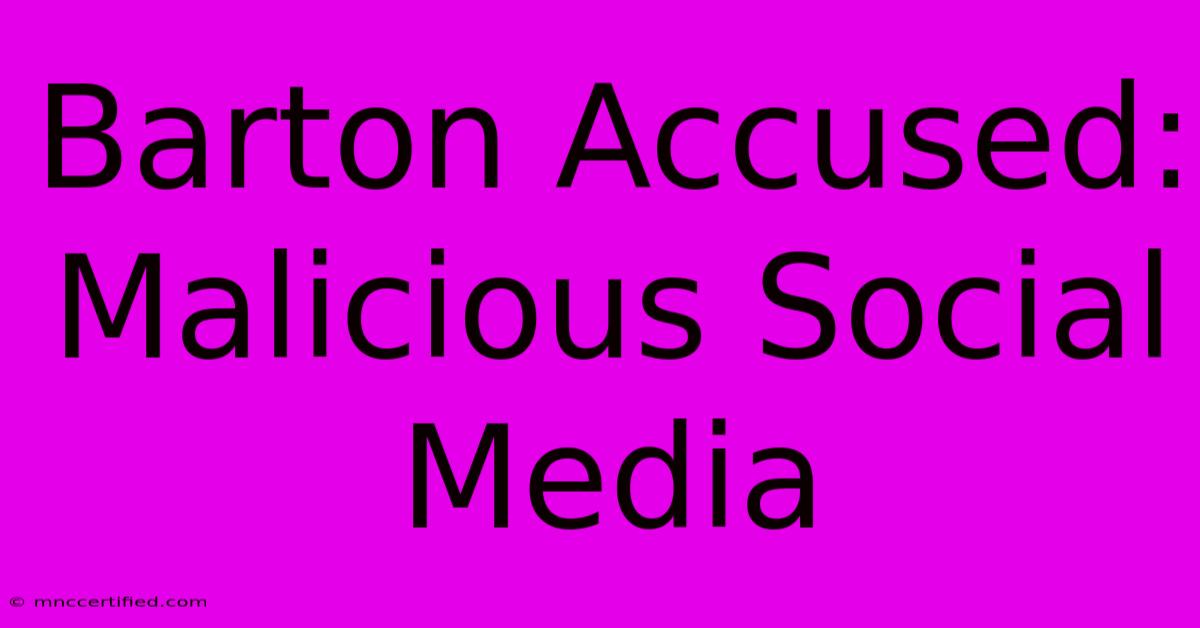Barton Accused: Malicious Social Media

Table of Contents
Barton Accused: Navigating the Murky Waters of Malicious Social Media
The internet, a seemingly boundless realm of connection and information, harbors a dark underbelly: malicious social media campaigns. Recently, the case of Barton Accused highlights the devastating consequences of online harassment and the urgent need for digital responsibility. This article delves into the Barton case, explores the nature of malicious social media activity, and offers strategies for navigating this increasingly toxic digital landscape.
Understanding the Barton Accused Case: A Social Media Nightmare
The specifics of the "Barton Accused" case may vary depending on the specific instance you're referring to (as this appears to be a hypothetical or generalized example). However, the core elements likely involve a person or entity named Barton facing accusations spread and amplified through social media. These accusations, regardless of their truthfulness, can inflict significant damage:
- Reputational Damage: False or misleading information shared online can irrevocably tarnish a person's reputation, impacting their professional life, personal relationships, and mental health.
- Cyberbullying and Harassment: Malicious social media campaigns often involve coordinated attacks, including hateful comments, threats, doxxing (revealing personal information), and the spread of manipulated content.
- Legal Ramifications: False accusations and defamatory statements shared online can lead to serious legal consequences, including lawsuits and criminal charges.
Key takeaway: The Barton Accused case serves as a stark reminder of the power of social media to inflict harm. Understanding the mechanics of such campaigns is crucial to mitigating their impact and preventing future occurrences.
The Anatomy of a Malicious Social Media Campaign
Malicious social media campaigns aren't spontaneous events; they are often orchestrated using specific tactics:
1. False Accusations & Misinformation:
The foundation of most malicious campaigns is the dissemination of false or misleading information. This can take the form of fabricated stories, manipulated images or videos (deepfakes), or selective editing of existing content to create a false narrative.
2. Amplification & Viral Spread:
Once the initial false information is released, it's strategically amplified through various channels, including social media platforms, online forums, and even traditional media outlets. The speed and reach of the internet ensures rapid dissemination, making damage control difficult.
3. Targeted Harassment & Online Mobbing:
Often, malicious campaigns involve targeted harassment and online mob mentality. Victims are inundated with abusive messages, threats, and public shaming, creating a hostile and intimidating online environment.
4. Doxxing & Privacy Violation:
The sharing of private and sensitive information—addresses, phone numbers, financial details—is a common tactic used to further intimidate and harass the victim.
Protecting Yourself from Malicious Social Media Campaigns
While you can't completely prevent malicious social media attacks, proactive measures can significantly reduce your vulnerability:
- Maintain a Strong Online Presence: A well-maintained online presence can help counter misinformation by showcasing your true character and achievements.
- Monitor Your Online Reputation: Regularly check your online mentions to identify and address potentially damaging content promptly.
- Report and Block Abusive Content: Utilize the reporting mechanisms on social media platforms to report abusive behavior and block malicious users.
- Document Everything: Keep records of all abusive messages, threats, and evidence of online harassment. This is crucial for legal action if necessary.
- Seek Legal Counsel: If you become the victim of a serious malicious social media campaign, seek legal advice to understand your options and protect your rights.
The Future of Online Safety: Combating Malicious Social Media
Addressing the problem of malicious social media requires a multi-pronged approach:
- Increased Platform Accountability: Social media companies need to take more responsibility for combating misinformation and online harassment on their platforms.
- Improved Education & Awareness: Educating users on responsible online behavior and the dangers of malicious social media campaigns is crucial.
- Strengthened Legal Frameworks: Laws need to be strengthened to hold individuals and entities accountable for online defamation and harassment.
The Barton Accused case, while hypothetical, embodies the real and pervasive threat of malicious social media. By understanding the mechanics of these campaigns and taking proactive steps to protect ourselves, we can work towards a safer and more responsible digital world.

Thank you for visiting our website wich cover about Barton Accused: Malicious Social Media. We hope the information provided has been useful to you. Feel free to contact us if you have any questions or need further assistance. See you next time and dont miss to bookmark.
Featured Posts
-
Sherrock Loses To Littler In Darts
Dec 18, 2024
-
Keely Hodgkinsons Coaches Painter And Meadows
Dec 18, 2024
-
Japan Automakers In Merger Talks
Dec 18, 2024
-
Athletics Star Wins Bbc Spoty
Dec 18, 2024
-
Fallon Sherrock Littlers Disrespect
Dec 18, 2024